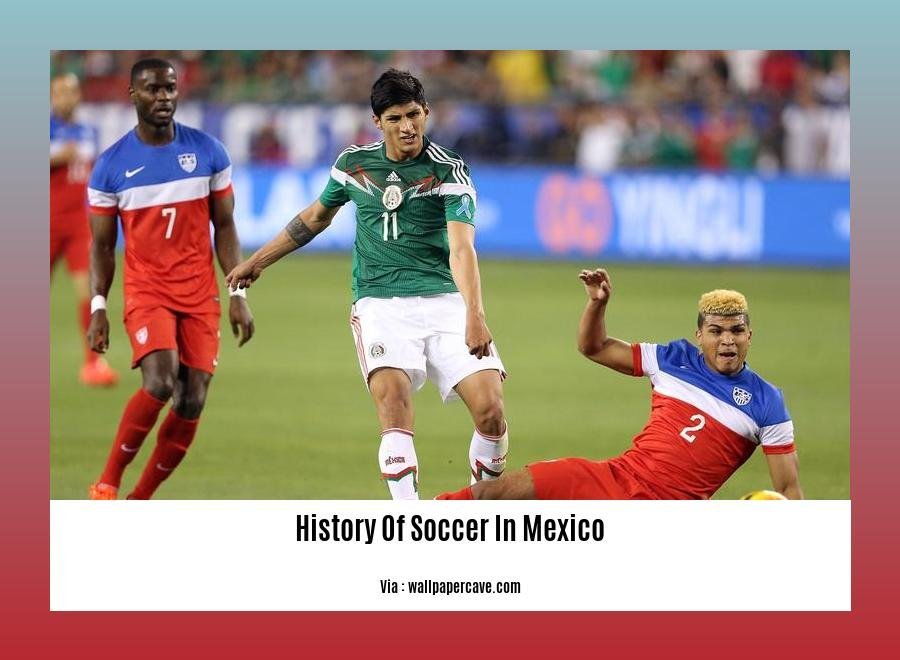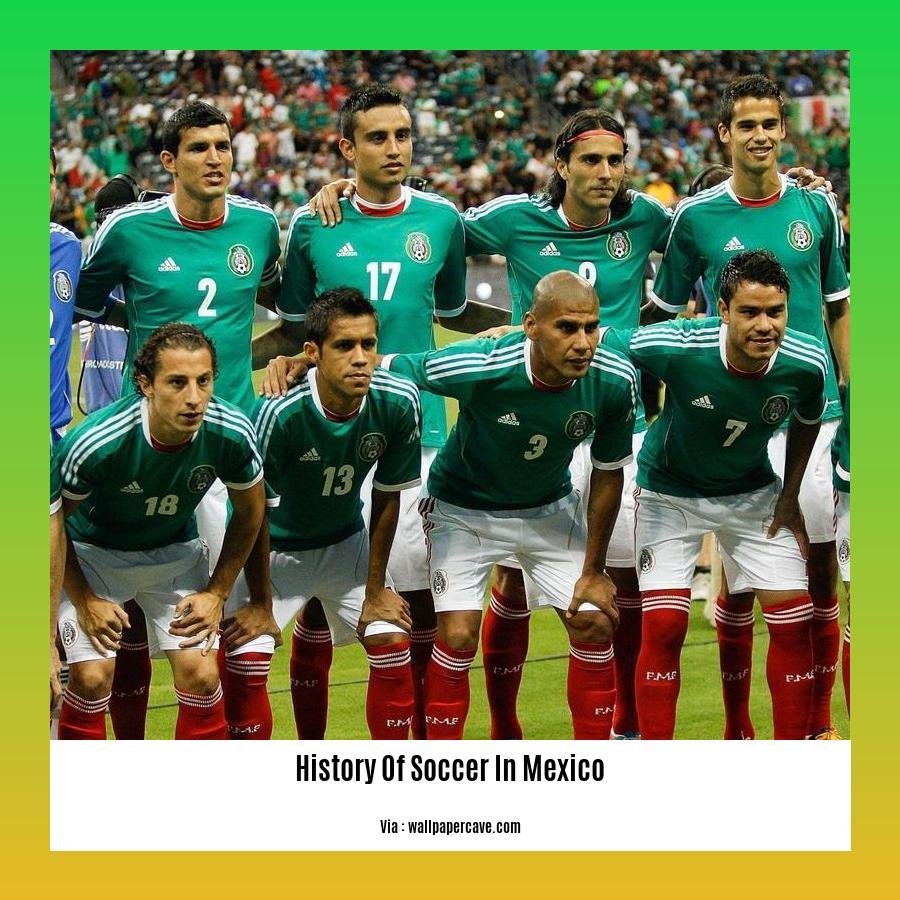Delve into the captivating history of soccer in Mexico, a tale of humble beginnings, unwavering passion, and global prominence. From its introduction by British miners in the late 19th century to the electrifying atmosphere of the 1970 World Cup, Mexican soccer has woven its way into the fabric of the nation’s identity, becoming a symbol of unity, pride, and unwavering resilience. [- The History of Soccer in Mexico: From Humble Beginnings to Global Prominence].
Key Takeaways:
- Soccer, also known as “fútbol”, was introduced to Mexico by English miners in the late 19th century, coinciding with the establishment of the game’s official rules and its global spread.
- Soccer holds great significance as the most popular sport in Mexico, captivating audiences as a popular pastime and the most-watched sport in the country.
- The establishment of the first teams in the early 1900s led to the rapid rise of soccer’s popularity.
- Mexico joined FIFA in 1929, but its soccer history remained relatively quiet for the next 40 years due to a lack of notable success.
- The 1970 World Cup, hosted by Mexico, transformed the perception of soccer in the country, leading to an exponential increase in its popularity at the grassroots level.
History of Soccer in Mexico

In the heart of Latin America, where passion and artistry converge, lies the captivating history of soccer in Mexico, a tale of humble beginnings that blossomed into global prominence.
The Roots of Soccer in Mexico
The seeds of soccer were planted in Mexico in the late 19th century, carried by English miners who brought their love for the game to the vibrant shores of this fútbol-loving nation. Coinciding with the formalization of the game’s rules and its global spread, soccer found fertile ground in Mexico, taking root in the country’s rich sporting culture.
As the 20th century dawned, the game gained rapid popularity, with the establishment of the first teams igniting a passion that would soon sweep across the nation. The formation of the Mexican Football Federation in 1927 marked a significant milestone, laying the foundation for organized competition and paving the way for Mexico’s entry into the global soccer stage.
Joining the World Stage
In 1929, Mexico joined FIFA, the governing body of international soccer, signaling its intent to compete on the world stage. However, for the next four decades, Mexico’s presence in international soccer remained relatively quiet, as the nation focused on developing its domestic leagues and nurturing its burgeoning talent.
The turning point came in 1970 when Mexico hosted the FIFA World Cup, an event that transformed the perception of soccer in the country. The tournament showcased Mexico’s passion for the game, captivated audiences worldwide, and left an indelible mark on the nation’s sporting landscape.
A Golden Era Emerges
The 1970s marked the beginning of a golden era for Mexican soccer. The national team, fueled by talented players like Hugo Sánchez and Jorge Campos, achieved unprecedented success, qualifying for consecutive World Cups and capturing the imagination of a nation.
Domestically, the Mexican league flourished, with fierce rivalries and iconic teams capturing the hearts of millions. Club América, Guadalajara, and Cruz Azul emerged as powerhouses, showcasing the depth and quality of Mexican soccer.
A Global Force
In recent years, Mexican soccer has solidified its status as a global force. The national team has consistently qualified for the World Cup, reaching the Round of 16 on multiple occasions. Mexican players have made their mark in top European leagues, showcasing their skills and earning international acclaim.
The history of soccer in Mexico is a testament to the enduring power of the beautiful game. From humble beginnings to global prominence, the journey of Mexican soccer is one filled with passion, skill, and unwavering determination.
Delve into the fascinating history of Surigao del Norte and how it navigated various influences, shaping its unique character, culture, and beautiful landscapes. history of surigao del norte
Discover the rich history of the Ethiopian Orthodox Church, an ancient institution that has played a pivotal role in shaping the religious, cultural, and social fabric of Ethiopia. history of the ethiopian orthodox church
History of Football in Mexico

Fútbol, or soccer as it’s known globally, has a rich history in Mexico, intertwined with the country’s heritage and deeply rooted in its culture. From humble beginnings to a global prominence, Mexican fútbol has come a long way.
Key Takeaways:
- The game’s introduction to Mexico in the late 19th century marked the start of a beautiful journey.
- The establishment of organized leagues in the early 1900s propelled soccer’s popularity.
- Mexico’s participation in international tournaments brought recognition and a surge of national pride.
- Hosting the FIFA World Cup twice, in 1970 and 1986, solidified the country’s status as a soccer powerhouse.
- Mexican players and teams have made their mark in international competitions, earning accolades and admiration.
Early Days:
In the late 19th century, Mexico’s mining industry attracted foreign workers, including English miners who brought with them their passion for soccer. This was the spark that ignited Mexico’s love for the beautiful game.
Organized Play and Professional Leagues:
The early 1900s saw the formation of organized leagues and professional teams, including the legendary Club América, founded in 1916. This paved the way for the development of local talent and the growth of a competitive domestic league system.
Mexico on the International Stage:
Mexico’s soccer prowess gained international recognition with its participation in the FIFA World Cup. The 1930 World Cup marked their debut, and they’ve since made numerous appearances on the global stage.
Hosting the World Cup:
Mexico had the honor of hosting the FIFA World Cup twice, in 1970 and 1986. These events showcased the country’s passion for the sport and left an indelible mark on Mexican history.
Mexican Football Legends:
Individual brilliance has played a pivotal role in Mexico’s soccer success. Players like Hugo Sánchez, Javier Hernández, and Rafael Márquez have achieved international stardom, inspiring generations of Mexican footballers.
Conclusion:
Mexico’s soccer history is a story of passion, perseverance, and triumph. From its humble beginnings to its current status as a global force, Mexican fútbol has captured the hearts of millions. The sport continues to evolve, promising new chapters in this captivating narrative.
(Sources)
- Soccer in Mexico: A History of Passion, Pride, and Progress
- The History of Soccer in Mexico: A Timeline
FAQ
Q1: How was soccer introduced to Mexico?
A1: Soccer was introduced to Mexico in the late 19th century by English miners who brought the game with them as they came to work in the mining industry. These miners established the first soccer teams and played matches among themselves, gradually introducing the sport to the local population.
Q2: When did Mexico join FIFA?
A2: Mexico joined FIFA, the international governing body of soccer, in 1929, becoming one of the earliest members from the North American region. This marked a significant step in the development of organized soccer in Mexico and facilitated the country’s participation in international competitions.
Q3: What was the turning point for soccer in Mexico?
A3: The 1970 FIFA World Cup, hosted by Mexico, served as a pivotal moment for soccer in the country. The successful hosting of the tournament, coupled with the national team’s strong performance, generated immense enthusiasm and support for the sport. This period marked a turning point, leading to the exponential growth of soccer’s popularity in Mexico and its transformation into a national obsession.
Q4: How did the 1970 World Cup impact soccer in Mexico?
A4: The 1970 World Cup had a profound impact on soccer in Mexico. The tournament showcased the sport to a global audience and introduced Mexican players and fans to the highest level of international competition. The success of the Mexican team, which reached the quarterfinals, fueled national pride and inspired a new generation of players and fans. The World Cup also left a lasting legacy, contributing to the development of soccer infrastructure and the establishment of a strong domestic league system.
Q5: How did soccer become so popular in Mexico?
A5: Soccer gained popularity in Mexico due to several factors. The introduction of the game by English miners in the late 19th century laid the foundation for its growth. The establishment of the Mexican Football Federation in 1927 and the subsequent participation of the national team in international competitions further fueled the sport’s popularity. The successful hosting of the 1970 FIFA World Cup and the national team’s strong performance during the tournament were pivotal moments that solidified soccer’s position as the most beloved sport in Mexico.
- Legalize Marinara: How a Sauce Became a Symbol (and a Side of Social Commentary) - November 22, 2024
- Lebanon Public Schools Calendar 2023-2024 & 2024-2025 - November 22, 2024
- Navigating Lucas County Property Taxes: A Guide to the Auditor’s Office Resources - November 22, 2024














